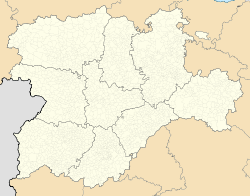
Pamplona, historically also known as Pampeluna in English, is the capital city of the Chartered Community of Navarre, in Spain.

The Douro is the largest river of the Iberian Peninsula by discharge. It rises near Duruelo de la Sierra in the Spanish province of Soria, meanders briefly south, then flows generally west through the northern part of the Meseta Central in Castile and León into northern Portugal. Its largest tributary is the right-bank Esla. The Douro flows into the Atlantic Ocean at Porto, the second largest city of Portugal.
Mequinenza or Mequinensa is a town and municipality of the province of Zaragoza, in the autonomous community of Aragon, Spain. It is located beside the river Segre, close to its confluence with the river Ebro between the Mequinenza Dam and Riba-roja reservoir.

The province of Burgos is a province of northern Spain, in the northeastern part of the autonomous community of Castile and León. It is bordered by the provinces of Palencia, Cantabria, Vizcaya, Álava, La Rioja, Soria, Segovia, and Valladolid. Burgos is the province of Spain that has borders with most provinces. Its capital is the city of Burgos.

The Battle of Tudela saw an Imperial French army led by Marshal Jean Lannes attack a Spanish army under General Castaños. The battle resulted in the complete victory of the Imperial forces over their adversaries. The combat occurred near Tudela in Navarre, Spain during the Peninsular War, part of a wider conflict known as the Napoleonic Wars.
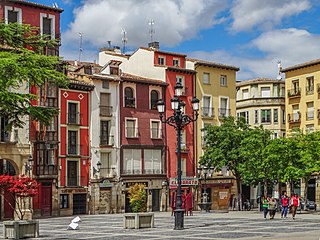
Logroño is the capital of the autonomous community of La Rioja, Spain. Located in the north of the Iberian Peninsula, primarily in the right (South) bank of the Ebro River, Logroño has historically been a place of passage, such as the Camino de Santiago. Its borders were disputed between the Iberian kingdoms of Castille, Navarre and Aragon during the Middle Ages.

Compagnie de Saint-Gobain S.A. is a French multinational corporation, founded in 1665 in Paris as the Manufacture royale de glaces de miroirs, and today headquartered on the outskirts of Paris, at La Défense and in Courbevoie. Originally a mirror manufacturer, it also produces a variety of construction, high-performance, and other materials. Saint-Gobain is present in 76 countries and as of 2022 employs more than 170,000 people.

Lapuebla de Labarca is a town and municipality located in the province of Álava, in the Basque Country, northern Spain. Today Lapuebla de Labarca is a town of 868 inhabitants, dynamic and marked by its agricultural economy related to the production and sale of wine of Denomination of Origin Rioja Alavesa.
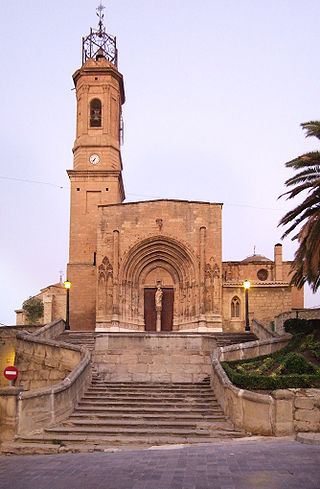
Caspe is a municipality in the province of Zaragoza, part of the autonomous community of Aragon, in Spain, seat of the comarca of Bajo Aragón-Caspe. As of 2018 it had a population of 9,525 inhabitants and its municipality, of 503.33 km2, is the fourth largest in Aragon.

Miranda de Ebro is a city on the Ebro river in the province of Burgos in the autonomous community of Castile and León, Spain. It is located in the north-eastern part of the province, on the border with the province of Álava and the autonomous community of La Rioja. According to the 2008 census conducted by Spain's National Institute of Statistics, it has a population of 39,589 inhabitants, making it the second most populous city in the province after the capital, Burgos.

Las Merindades is a comarca located north of the province of Burgos, in the autonomous community of Castile and León. It is bounded on the north-west by the province of Cantabria, north-east by the province of Biscay, south by La Bureba, south-east by Ebro, south-west by Páramos, and on the east by the province of Álava.

Campoo is a comarca (district) of Cantabria (Spain) located in the High Ebro. With an area of slightly more than 1,000 km2, it includes the municipalities of Hermandad de Campoo de Suso, Campoo de Enmedio, Campoo de Yuso, Valdeolea, Valdeprado del Río, Valderredible, Reinosa, Las Rozas de Valdearroyo, Santiurde de Reinosa, Pesquera, and San Miguel de Aguayo. The local inhabitants are called Campurrians . Its highest elevation is the Cuchillón peak, and the lowest is Pesquera, with the capital, Reinosa at 850 m.

Briviesca is a municipality and a Spanish city located in the north of the Iberian Peninsula, head of the judicial district of Briviesca, capital of the comarca of La Bureba and province of Burgos, autonomous community of Castile and León. According to the demographic data of 2017, the municipality has 6,861 inhabitants, being the 4th most populated in the province. The municipality of Briviesca is made up of five towns: Briviesca, Cameno, Quintanillabón, Revillagodos and Valdazo.
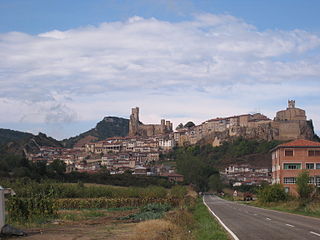
Frías is a town located in the northern part of the province of Burgos, in Castile and León, Spain. In 2010 it had a population of only 275 inhabitants.
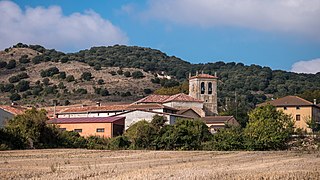
Santa Olalla de Bureba is a municipality and town located in the province of Burgos, Castile and León, Spain. According to the 2004 census (INE), the municipality has a population of 33 inhabitants.

Utebo is a town located in the province of Zaragoza, Aragon, Spain. At the time of the 2011 census (INE), the municipality had a population of 18,602 inhabitants, being the third most populous town of the province, only surpassed by Zaragoza and Calatayud, and one of the most populous in Aragon.

Saint-Gobain is a commune in the Aisne department in Hauts-de-France in northern France.
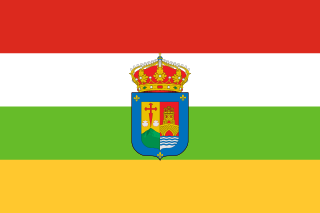
La Rioja is an autonomous community and province in Spain, in the north of the Iberian Peninsula. Its capital is Logroño. Other cities and towns in the province include Calahorra, Arnedo, Alfaro, Haro, Santo Domingo de la Calzada, and Nájera. It has an estimated population of 315,675 inhabitants, making it the least populated autonomous community of Spain.
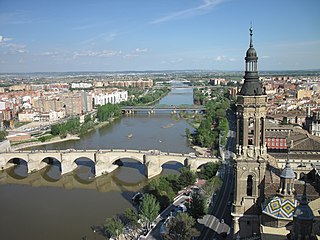
The Ebro is a river of the north and northeast of the Iberian Peninsula, in Spain. It rises in Cantabria and flows 930 kilometres (580 mi), almost entirely in an east-southeast direction. It flows into the Mediterranean Sea, forming a delta in the Terres de l'Ebre region, in southern Catalonia. In the Iberian peninsula, it ranks second in length after the Tagus and second in discharge volume, and drainage basin, after the Douro. It is the longest river entirely within Spain; the other two mentioned flow into Portugal.

The Mountains of Miranda de Ebro and Ameyugo, commonly known as Monte de Miranda or Monte de San Juan, are a Special Area of Conservation (SAC) in Spain, in the eastern part of Burgos province, bordering with Álava and La Rioja. Geographically, they belong to the Comarca del Ebro and are located at the easternmost end of the Obarenes Mountains and south of the city of Miranda de Ebro. The Saint John of the Mountain Festival is held here every year.



